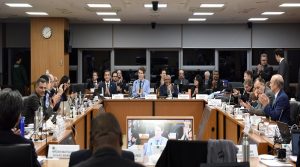The Board of the Green Climate Fund (GCF) concluded its 36th meeting in Incheon, Republic of Korea on Thursday, July 13, 2023, with several major outcomes for climate action. Notably, during the four-day meeting, the Board adopted the Fund’s 2024-2027 Strategic Plan and approved $755.8 million of finance for new climate projects in developing countries.

Co-chair, Nauman Bashir Bhatti, said: “The Board has given the green light to twelve new projects with a strong focus on increasing direct access and building resilience in the developing countries that are particularly vulnerable to the adverse impacts of climate change. With the new strategic plan approved, I am confident that GCF is moving in the right direction to deliver enhanced support and impact for developing countries.”
Co-chair, Victoria Gunderson, said: “This has been a very constructive Board meeting with the approval of an ambitious and inspiring strategic plan for the next four years. With a growing portfolio and a collaborative spirit on the Board, GCF will make a stronger contribution to global climate action during its next programming period.”
GCF interim Executive Director, Henry Gonzalez, said: “This Board meeting was a success on many fronts with the adoption of a new strategic plan and the approval of $755.8 million in climate financing for 12 new projects. By signing funding agreements for half of these new projects immediately, we are showing our focus on implementing climate action on the ground as rapidly as possible. The meeting helps build momentum for our replenishment and sets a clear path for the future.”
The 2024-2027 Strategic Plan articulates GCF’s major programming directions for its second programming period (GCF-2), with the aim to deliver strengthened climate results and greater access for developing countries. It reflects the urgency of the climate crisis and highlight’s the Fund’s growth and maturation as it becomes even more transformative and accessible.
Twelve new projects were approved by the Board, bringing GCF’s portfolio to a total of 228 projects and $12.8 billion in GCF funding. With co-financing, the total value of the portfolio is $48.3 billion. Spanning countries such as Haiti, Pakistan, Bangladesh, South Africa, Barbados and Solomon Islands, most of the projects target Least Developed Countries, Small Island Developing States and African States and more than half of the projects are primarily focused on adaptation.
Project agreements (Funding Activity Agreements) are being signed for six of the projects on the sidelines of the Board meeting immediately after their approvals, reflecting the urgency by GCF and project partners to deliver projects on the ground.
The Board also approved the accreditation of four new organisations, three of which are Direct Access Entities (DAEs): Corporación Nacional para el Desarrollo (CND) based in Uruguay, Development Bank of Jamaica Limited (DBJ) based in Jamaica, DFCC Bank PLC (DFCC Bank) based in Sri Lanka, and responsAbility Investments AG (responsAbility), based in Switzerland.
Four organisations were re-accredited, which include Banque Ouest Africaine de Développement (West African Development Bank; BOAD), Corporación Andina de Fomento (CAF), Fundación Avina, and Agence Française de Développement (AFD). This brings the total number of GCF Accredited Entities to 118, including 75 regional or national DAEs.
The Board also approved Accreditation Master Agreements (AMAs) to continue the partnership for a second term with two Accredited Entities: the Asian Development Bank (ADB) and the United Nations Environment Programme (UNEP). Both AMAs were also signed at B.36.
Among the other agenda items, the Board discussed the revised strategy for the Readiness and Preparatory Support Programme 2024-2027 and enhancements to the Project Preparation Facility (PPF), which will be presented for adoption at the next Board meeting, as well as reviewing an evaluation by the Independent Evaluation Unit of GCF’s investments in Africa.
The Board requested the Secretariat to develop a framework for a local currency financing pilot programme and commissioned a feasibility study on establishing a GCF regional presence. The Secretariat and independent units also presented updates on GCF activities, including the status of GCF resources, pipeline, and portfolio performance.
The Board adopted the updated policy for contributions, which will set the standard provisions for contribution agreements for GCF-2. The Board was also updated on the Fund’s second replenishment by the replenishment facilitator, Dr Mahmoud Mohieldin. The replenishment will culminate in a pledging conference on October 5 in Bonn, when pledges to GCF for the 2024-2027 period will be made.
The 37th meeting of the GCF Board will be held from October 23 to 26, 2023 in Georgia.
The 12 projects approved at the meeting are:
- FP206: Resilient Homestead and Livelihood support to the vulnerable coastal people of Bangladesh (RHL) with Palli Karma-Sahayak Foundation (PKSF)
- FP207: Recharge Pakistan: Building Pakistan’s resilience to climate change through Ecosystem-based Adaptation (EbA) and Green Infrastructure for integrated flood risk management with World Wildlife Fund (WWF)
- FP208: Enhanced climate resilience in the Trois Rivières region of Haiti through Integrated Flood Management with United Nations Development Programme (UNDP)
- FP209: Climate Change Resilience through South Africa’s Water Reuse Programme (“WRP”) with Development Bank of Southern Africa (DBSA)
- FP210: KawiSafi II with Acumen
- FP211: Hardest-to-Reach with Acumen
- FP212: &Green Fund: Investing in Inclusive Agriculture and Protecting Forests with Dutch Entrepreneurial Development Bank (FMO)
- FP213: The Blue Green Bank (BGB) with Pegasus Capital Advisors
- SAP026: Extended Community Climate Change Project-Drought (ECCCP-Drought) with Palli Karma-Sahayak Foundation (PKSF)
- SAP027: Solomon Islands Knowledge-Action-Sustainability for Resilient Villages (SOLKAS) Project with Save the Children Australia
- SAP028: Women-Adapt: Enhancing the climate change adaptive capacity of smallholder farmer communities in the Poro Region, focusing on vulnerable women and youth with World Food Programme (WFP)
- SAP029: Ecosystem-based Adaptation (EbA) for Reducing Community Vulnerability to Climate Change in Northern Pacific Small Island Developing States (SIDS) with Micronesia Conservation Trust (MCT)
The new projects represent a combined total of $755.8 million in GCF funding.
